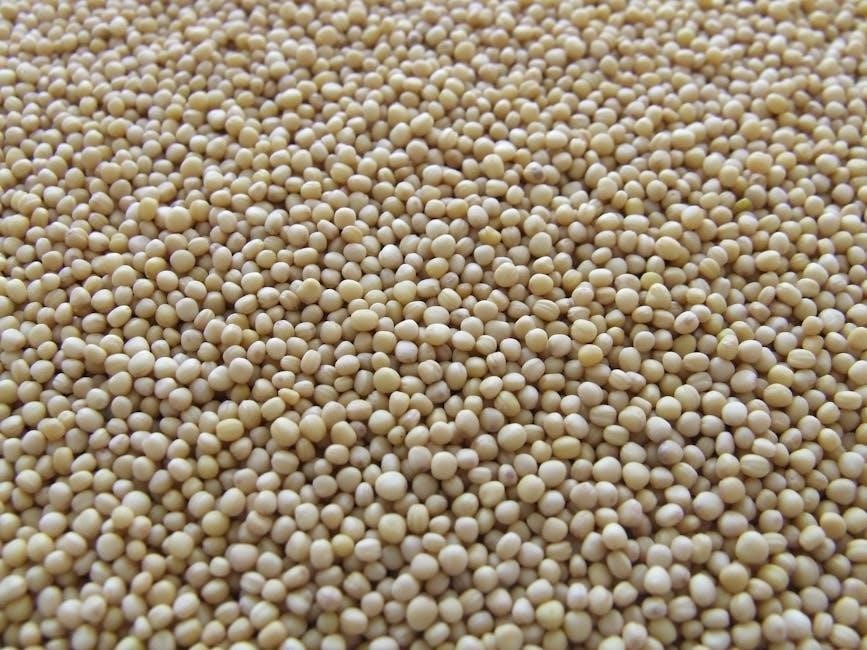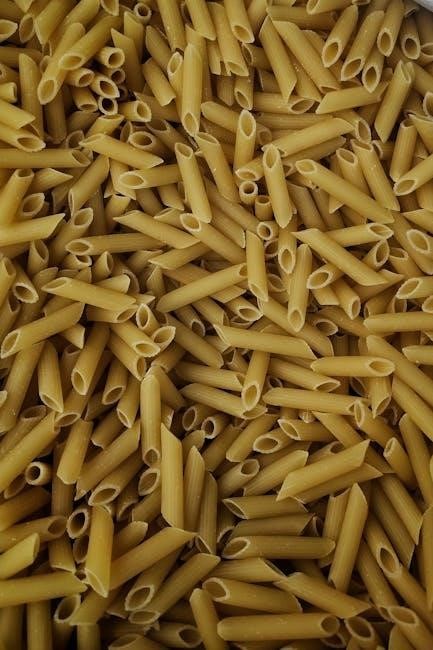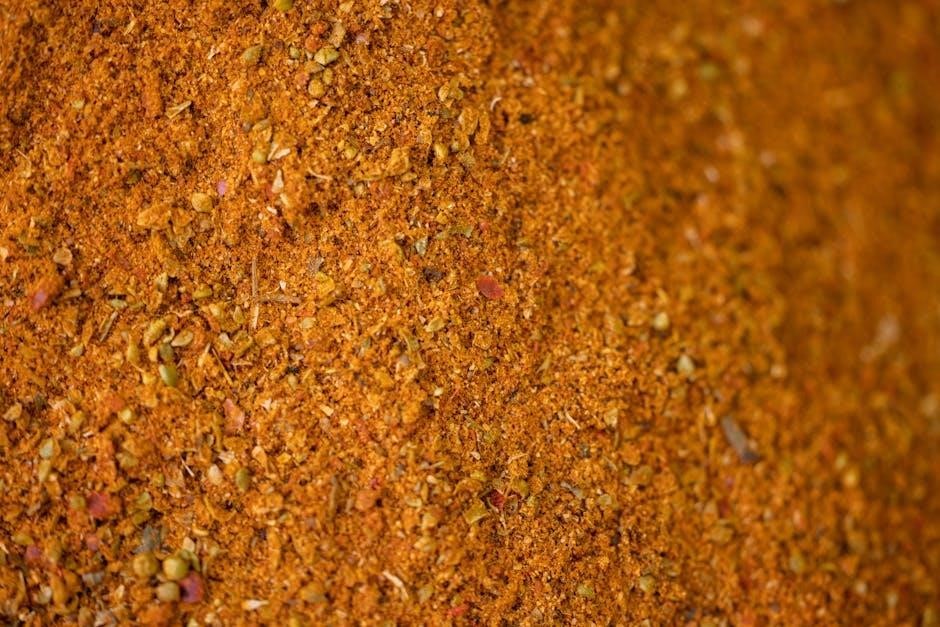Lean bulking is a strategic approach to gaining muscle mass while minimizing fat accumulation․ It involves a controlled calorie surplus with nutrient-dense, whole foods to support growth and maintain a healthy body composition․
What is Lean Bulking?
Lean bulking is a sustainable approach to gaining muscle mass by consuming a slight calorie surplus of nutrient-dense, whole foods․ It focuses on clean eating, avoiding processed foods, and maintaining a balanced macronutrient intake․ Unlike dirty bulking, which prioritizes rapid weight gain, lean bulking emphasizes gradual muscle growth with minimal fat accumulation․ This method is ideal for individuals seeking to improve body composition while staying healthy․ By adhering to a structured meal plan, individuals can achieve their muscle-building goals without compromising overall wellness․ Lean bulking requires discipline, patience, and a well-planned diet to ensure steady progress and long-term results․
Benefits of Lean Bulking
Lean bulking offers numerous advantages for those seeking to build muscle sustainably․ It promotes steady muscle growth while minimizing fat gain, resulting in improved body composition and a more defined physique․ By focusing on nutrient-dense foods, lean bulking supports overall health and energy levels, reducing the risk of chronic diseases․ This method also enhances metabolic efficiency and boosts muscle recovery, allowing for more intense workouts․ Additionally, lean bulking fosters healthier eating habits, encouraging a long-term commitment to wellness․ Unlike dirty bulking, it avoids excessive fat accumulation, making it easier to maintain a lean appearance year-round․ Overall, lean bulking is a balanced and sustainable approach for achieving muscle growth while preserving a healthy, athletic body․

Understanding Macronutrients for Lean Bulking
Macronutrients—protein, carbohydrates, and fats—are essential for lean bulking, providing the energy and building blocks needed for muscle growth and recovery while maintaining a balanced diet․

Protein: The Building Block of Muscle
Protein is the cornerstone of lean bulking, essential for muscle repair and growth․ Aim for 1․2-2․2 grams of protein per kilogram of body weight daily․ Include high-quality sources like lean meats, fish, eggs, dairy, and plant-based options such as lentils and legumes․ Protein shakes are convenient for meeting daily targets․ Balanced intake ensures muscle maintenance and recovery, supporting your fitness goals effectively․
Carbohydrates: Energy for Growth

Carbohydrates are vital for energy production and muscle recovery during lean bulking․ They provide the fuel needed for intense workouts and support muscle growth․ Focus on complex carbs like whole grains, vegetables, and fruits, which are rich in fiber and essential nutrients․ Aim for 40-50% of your daily calories to come from carbs, ensuring they are nutrient-dense and low in added sugars․ Examples include oats, quinoa, brown rice, and sweet potatoes․ These carbs help maintain energy levels and promote muscle recovery without excessive fat gain․ Timing carb intake around workouts can optimize performance and recovery, making them a cornerstone of a successful lean bulk meal plan․
Fats: Essential for Hormone Health
Fats play a crucial role in hormone production and overall health during lean bulking․ They support the synthesis of testosterone and other anabolic hormones, which are essential for muscle growth․ Healthy fats like avocados, nuts, seeds, and olive oil are ideal choices, providing sustained energy and reducing inflammation․ Aim for 20-30% of your daily calories to come from fats, ensuring a balance of saturated and unsaturated varieties․ Avoid trans fats and processed oils, which can hinder progress․ Incorporating these fats into meals not only enhances flavor but also supports hormonal balance, making them a key component of a well-rounded lean bulk diet․

Creating a Lean Bulk Meal Plan
Creating a lean bulk meal plan involves balancing macronutrient intake, focusing on whole foods, and maintaining a slight calorie surplus to support muscle growth without excess fat․
Setting Caloric Intake Goals
Setting caloric intake goals is crucial for lean bulking, as it ensures a balance between muscle growth and fat gain․ Start by calculating your maintenance calories, which is the number of calories your body needs to function at rest․ A slight surplus of 5-10% above maintenance is typically recommended for lean bulking, allowing for steady muscle gains without excessive fat accumulation․ For example, if your maintenance is 2,500 calories, aim for 2,625-2,750 calories daily․ Factors like activity level, weight, and metabolism will influence your specific needs․ Tracking progress weekly and adjusting as needed ensures you stay on course․ This approach helps maintain a healthy body composition while supporting muscle development․
Meal Frequency and Timing
Meal frequency and timing play a significant role in lean bulking, helping to optimize muscle growth and recovery․ Aim for 4-5 balanced meals throughout the day, including breakfast, snacks, lunch, dinner, and a post-workout shake․ Eating smaller, frequent meals helps maintain a positive nitrogen balance, essential for muscle synthesis․ Prioritize protein-rich meals every 3-4 hours to keep amino acid levels consistent․ Timing meals around workouts is also crucial—consume a pre-workout meal with carbs and protein 1-2 hours before training, and a post-workout meal or shake within 30-60 minutes after exercise to replenish energy stores and support recovery․ Consistency in meal timing ensures steady nutrient absorption and supports overall muscle growth goals․
Sample Daily Meal Plan

A well-structured sample daily meal plan for lean bulking includes balanced meals and snacks to meet caloric and macronutrient needs․ Start with a protein-packed breakfast like scrambled eggs with avocado and toast․ Mid-morning, have a protein shake or Greek yogurt with berries․ Lunch could feature grilled chicken with quinoa and mixed vegetables․ An afternoon snack might include nuts and fruit․ Dinner should focus on lean protein such as salmon, paired with brown rice and steamed vegetables․ Finally, a bedtime snack like cottage cheese or a protein smoothie supports overnight recovery․ This plan ensures steady energy levels, muscle growth, and minimal fat gain, aligning with the principles of clean bulking․ Adjust portions based on individual caloric needs to maintain a healthy surplus for muscle development․
Food Choices for Lean Bulking
Focus on whole, nutrient-dense foods to support lean muscle growth․ Prioritize lean proteins, complex carbs, and healthy fats to optimize nutrition and minimize fat gain․
Lean Protein Sources
Lean protein sources are essential for muscle growth and repair during a lean bulk․ Opt for options like chicken breast, turkey, fish, eggs, and low-fat dairy․ Plant-based choices such as tofu, legumes, and whey protein are also excellent․ These foods provide sufficient protein to build muscle without excess saturated fats․ Incorporating a post-workout protein shake can help maximize recovery and muscle synthesis․ Eggs and egg whites are versatile and rich in essential amino acids․ Avoid processed meats and focus on whole, unprocessed protein sources to maintain a healthy body composition․ Consistency in protein intake ensures steady muscle growth while keeping fat gain minimal․


Complex Carbohydrates
Complex carbohydrates are a cornerstone of a lean bulk meal plan, providing sustained energy and fiber․ Foods like oats, brown rice, quinoa, and vegetables are rich in nutrients and support muscle recovery․ They help maintain stable blood sugar levels, preventing energy crashes and excessive fat storage․ Incorporate whole grains, starchy vegetables, and legumes to ensure a steady supply of carbs for workouts and muscle growth․ These foods also promote better digestion and overall health․ Balancing carb intake with protein and fats ensures a balanced diet for lean muscle gains․ Focus on whole, unprocessed sources to avoid unnecessary calories and maintain a healthy body composition․
Healthy Fats
Healthy fats are essential for hormone production and overall health, making them a vital part of a lean bulk meal plan․ Sources like avocados, nuts, seeds, olive oil, and fatty fish provide necessary calories and support muscle recovery․ These fats aid in the absorption of fat-soluble vitamins and maintain healthy cell function․ Incorporating them in moderation ensures a balanced diet without excessive fat gain․ Focus on unsaturated fats to promote better heart health and sustainable energy levels․ Healthy fats complement protein and carbs, supporting muscle growth while keeping the diet nutrient-dense and satisfying․ They play a crucial role in maintaining optimal body function and supporting lean muscle development․


Tracking Progress
Regularly monitoring weight, measurements, and muscle growth helps ensure lean bulking success․ Adjustments to diet and training maintain steady progress without excess fat gain․
Monitoring Weight Gain
Tracking weight gain is crucial during a lean bulk to ensure progress without excessive fat accumulation․ Aim to gain 0․5-1 kg per week for men and 0․25-0․5 kg per week for women․ Use a scale weekly and monitor body fat percentage for accuracy․ Progress photos and measurements provide visual confirmation of muscle growth․ Adjust calorie intake if weight gain is too slow or fat accumulation occurs․ Maintain a food diary to ensure adherence to the meal plan and make necessary adjustments․ Regular monitoring helps sustain a healthy balance between muscle growth and fat gain, ensuring the desired physique is achieved efficiently․ Consulting a nutritionist or trainer can refine these adjustments for optimal results․
Adjusting Caloric Intake
Caloric intake must be fine-tuned to maintain a lean bulk effectively․ Start with a modest surplus of 250-500 calories above maintenance levels to promote muscle growth without excess fat․ Monitor weight and body composition weekly; if progress stalls, increase calories in small increments of 100-200․ Conversely, if fat gain is too rapid, reduce intake slightly․ Adjustments should be gradual to avoid disrupting muscle growth or metabolic balance․ Focus on nutrient-dense foods, ensuring protein remains high to support muscle synthesis․ Regularly reassess calorie needs based on progress, activity level, and seasonal changes․ This tailored approach ensures sustained lean muscle growth and overall health․
Measuring Muscle Growth
Tracking muscle growth is essential for evaluating progress during a lean bulk․ Use a combination of methods like weekly weight measurements, body fat percentage assessments, and progress photos to monitor changes․ Track strength gains by logging workout performances, as increased lifting capacity often indicates muscle development․ Circumference measurements of key muscle groups provide additional insights․ Regularly assess how clothes fit and overall physique appearance․ These metrics help determine if adjustments to diet or training are needed․ Consistency and patience are key, as muscle growth is a gradual process․ By systematically measuring progress, you can refine your strategy to optimize lean muscle gains and maintain motivation throughout your journey․
